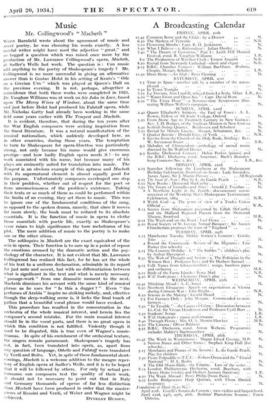Music
Mr. Collingwood's " Macbeth "
WHEN Barnfield wrote about the agreement of music and sweet poetry, he was choosing his words exactly. A less careful writer might have used the adjective " great," and so begged a question which was raised once more by the production of Mr. Lawrance Collingwood's opera, Macbeth, at Sadler's Wells last week. The question is : Can music add anything to the poetry of Shakespeare's tragedy ? Mr. Collingwood is no more successful in giving an affirmative answer than is Gustav Hoist in his setting of Keats's " Ode on a Grecian Urn " which was played at Queen's Hall on the previous evening. It is not, perhaps, altogether a coincidence that both these works were completed in 1925. Dr. Vaughan Williams was at work on Sir John in Love, based upon The Merry Wives of Windsor, about the same time and just before Hoist had produced his Falstaff opera, while Mr. Nicholas Gatty had already been working in the same field some years earlier with The Tempest and Macbeth.
It is evident, therefore, that during the ten years after the War English composers were seeking inspiration from the finest literature. It was a natural manifestation of the musical nationalism, which suddenly developed here, as in other countries, during those years. The temptation to turn to Shakespeare for opera-librettos was particularly strong, not only because his name would give enormous prestige-and how badly English opera needs it I-to any work associated with his name, but because many of his plays are eminently suited for translation into music. The Tempest is an obvious example of this aptness and Macbeth with its supernatural element is almost equally good for the purpose. Unfortunately composers overleaped one step in their problem, whether out of respect for the poet or from unconsciousness of the problem's existence. Taking their texts or so much of them as could be performed within the limits of an evening, they set them to music. This was to ignore one of the fundamental conditions of the sung, as opposed to the spoken drama, namely, that since it moves far more slowly, the book must be reduced to its absolute essentials. It is the function of music in opera to clothe those essentials with poetic life, exactly as Shakespeare's :verse raises to high significance the bare melodrama of his plot. The mere addition of music to the poetry is to make one or the other otiose.
The soliloquies in Macbeth are the exact equivalent of the aria in opera. Their function is to sum up in a point of repose the emotions aroused by the dramatic action and the psy- chology of the character. It is not evident that Mr. Lawrance Collingwood has realized this fact, for he has set the whole of his text to a uniform declamation, admirable in its regard for just note and accent, but with no differentiation between what is significant in the text and what is merely necessary
passage-work " from one dramatic moment to the next. Macbeth dismisses his servant with the same kind of musical phrase as he uses for " Is this a dagger ? " Even " the perfumes of Arabia " inspire no striking melody, and, effective though the sleep-walking scene is, it lacks the final touch of pathos that a beautiful vocal phrase would have evoked.
This procedure has resulted in the concentration in the orchestra of the whole musical interest, and herein lies the composer's second mistake. For the main musical interest should lie in the vocal parts, and there is no great opera in which this condition is not fulfilled. Violently though it used to be disputed, this is true even of Wagner's music- dramas. In spite of his enrichment of the orchestral texture, the singers remain paramount. Shakespeare's tragedy has not, in fact, been translated into opera, as, apart from any question of language, Othello and Falstaff were translated by Verdi and Boito. Yet, in spite of these fundamental short- comings, Macbeth is a welcome addition to the meagre reper- tory of English opera at Sadler's Wells, and it is to be hoped that it will be followed by others. For only by actual per- formance can composers test the quality of their work. It should not be necessary to point out that in Italy and Germany thousands of operas of far less distinction than Macbeth have been produced in order that the master- pieces of Rossini and Verdi, of Weber and Wagner might be












































 Previous page
Previous page